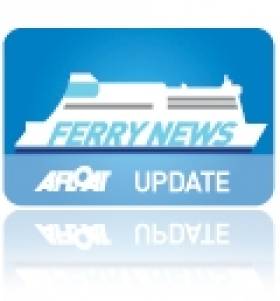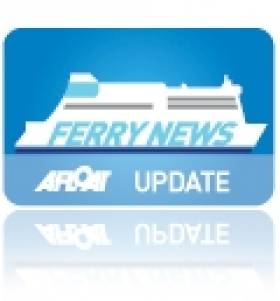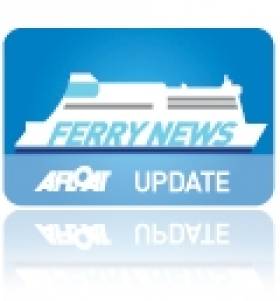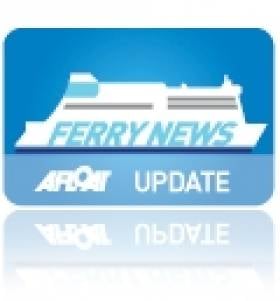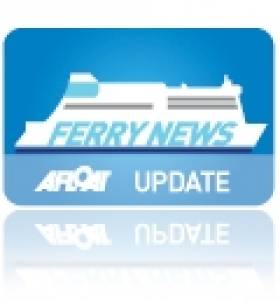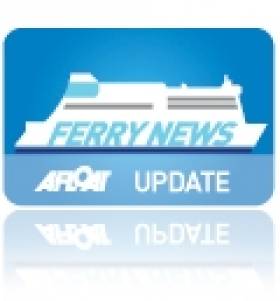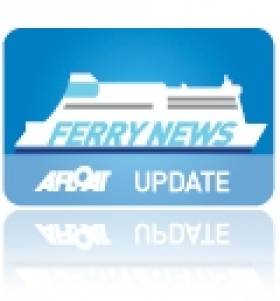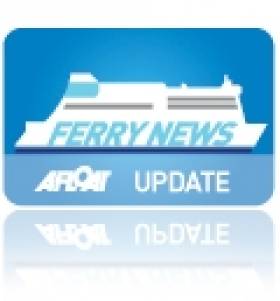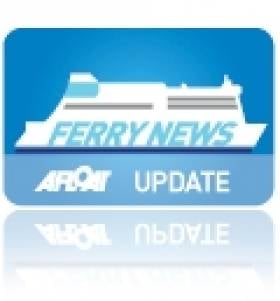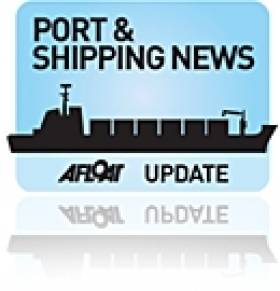Displaying items by tag: M.V. Julia
Pushing the Boat Out to Relaunch New Cork Ferry Service
#CORK FERRY RELAUNCH - According to today's Cork Independent, the Cork-Swansea ferry route which closed last Autumn has been followed-up by a new group to assess the feasibility of reopening the Celtic Sea service.
Those involved in the new group are from Cork County Council, the Port of Cork, Fáilte Ireland and representatives from the Irish Exporters Association which was announced by Mayor Tim Lombard, who believes that the wind up of Fastnet Line earlier this year and departure of ferry, has really hurt businesses in West Cork.
"There is a lack of tourism and a lack of business in West Cork this summer. There has been a major effect seen in the businesses in West Cork following the closure of the Fastnet Line," Cllr Lombard said. "It's why we are trying to push the boat out, if you pardon the pun," He added that the loss is also felt by the manufacturing sector which has lost a vital alternative freight link to the UK.
Former Fastnet Ferry Bids Farewell
#FASTNET FERRY – The ferry Julia (1981/22.161grt) which had operated the Fastnet Line Cork-Swansea service, set sail yesterday under her new name Wind Perfection, writes Jehan Ashmore.
Since the route closed in November last year (having only started in 2010) the German built ferry has been tied-up close to the city-centre in Cork. The ferry awaited an uncertain future after her co-operative owners failed to secure funds of €1m plus to maintain trading on the Celtic Sea.
Earlier this year she was sold to Dutch based C-Bed N.V. who are to re-fit the vessel, believed to be carried out in a shipyard in Denmark. The 1,860 passenger capacity ship is to be adapted for a new career as a floating dormitory for Siemens in the North Sea.
The vessel will be anchored at sea from where personnel working in the construction and servicing of offshore wind-farm turbine installations will be based.
Wind Perfection will join C-Bed's fleet which is also made up of two former ferries, one of which the Wind Ambition had also served Siemens while working at an offshore wind project in the Irish Sea.
Former Fastnet Ferry to Become Floating Hotel
#FERRY NEWS – The former Fastnet Line ferry Julia (1981 / 22,161grt) is to embark on a new life as a floating dormitory for workers building and servicing offshore wind turbines in the North Sea, according to The Examiner.
The rather ignominious end for the ferry once billed as one of the jewels in Cork tourism industry, marks the final chapter in the short and troubled life of Fastnet Line, which was set up by West Cork Tourism Co-operative.
At over 30 years-old the ship, which had capacity for 1,860 passengers, made its maiden voyage on the Cork-Swansea route in March 2010. She was bedevilled by mechanical problems in the first few days of operation, and in late 2011 the Celtic Sea service was withdrawn due to higher-than-expected fuel prices.
It had been hoped to restart the route this year, but Fastnet Line went into receivership last month. The vessel had been sold, reportedly for €5m, to C-BED, a Dutch-based company which are to rename her Wind Perfection.
For more on this story about the short-lived ferry operation click HERE.
€500k Sought to Restart Cork-Swansea Ferry Link
#FERRY NEWS - Approximately €500,000 is to be sought from three local authorities in the south-west region so to help restart the Cork-Swansea route which was served by the M.V. Julia (1982/22,161grt) until sailings ceased in November last year.
Representatives from Fastnet Line Ship Holdings Ltd are expected to attend a special meeting of Cork County Council next Monday at which they will outline a business plan for the company, which is in examinership.
They will also address a scheduled meeting of Cork City Council later the same day and are expected to communicate their request to Kerry County Council shortly.
For more about this story in today's Examiner click HERE
High Court Extends Protection for Cork-Swansea Ferry Operators
#FERRY NEWS-A High Court judge has agreed to continue court protection for the companies operating the Cork-Swansea ferry service to allow for finalisation of a survival scheme, reports The Irish Times.
Mr Justice Peter Kelly said yesterday he was satisfied to extend the protection period for the companies to January 24th next.
The extension of time was sought by Declan Murphy, for the companies' examiner Michael McAteer, to allow time for an investment agreement to be signed and a survival scheme put before meetings of creditors.
Fastnet Line Ship Holdings Ltd (100 per cent owned by the West Cork Tourism Co-operative Society Ltd) and related companies operating the ferry service using the M.V. Julia (1981/22,161grt) from the ferry terminal at Ringaskiddy, Co Cork, secured court protection last month.
Later Noel Murphy, chairman of the West Cork Tourism Co-Operative Society, said they had outlined the urgent funding required to secure the future of the service, which will allow them to present a financial proposal to the examiner in early January.
To date €673,000 has been raised by individual donors, customers, shareholders and local businesses, leaving just under €1 million to be raised.
Restructured Fastnet Line Reduce Year Round Service to Seasonal Schedule
The discontinued winter sailing schedule for this year is also expected not to be repeated during October 2012-March 2013. Fastnet Line's decision to make the Celtic Sea route into a shoulder season and summer only service follows a similar path taken by Stena Line which withdrew Dun Laoghaire-Holyhead (HSS) sailings in mid-September, for report click here. The central corridor route is due to reopen sometime in April or May 2012.
Cork City and County council and Kerry County council have provided €700,000 to support Fastnet Line and yesterday they announced an additional €150,000 in co-funding for the period of the examinership. In order to stabilise finances the ferry company are to radically reduce passenger capacity of the Julia (see photo) from 1,500 down to 950. This is in line with the capacities of the Julia serving 'night' sailings.
She has a crew predominately from Eastern Europe and Irish and UK deck officers. The Bermuda flagged, Hamilton registered vessel is currently berthed at Ringaskiddy Ferry Terminal, Cork Harbour. At 154m she is the largest ferry to date capable of berthing in the limited confines of the swing basin in Swansea and with a draft of 5.8m in a port which is subject to a large tidal range on the Bristol Channel.
Operating costs on the 10 hour service has been severely hampered by continuing increases to world oil prices. From the year 2010 to this year, fuel costs rose by 27% and almost 50% from the original budget of 2009. The company claims that each crossing amounts to €18,560 alone in fuel costs.
Fastnet Line to date has carried 150,000 customers, of which 75% have originated from the UK market, generating on average €350 per person (€40m approx) exclusive of fare and on-board spend. This crucial market is core to the success of the company's direct 'gateway' route to scenic south-west Ireland, with Swansea connected to the M4 motorway linking midland population centres and London. The operator claims a saving of 600km driving based on a round trip compared to using rival ferries running on routes to Rosslare from Pembroke Dock and Fishguard.
Since the reinstatement of the service in March 2010, after Swansea Cork Ferries pulled the Superferry (photo) off-service in 2006, the loss to tourism generated revenue on both sides of the Celtic Sea was estimated to be £25m per annum according to the Welsh Assembly and a similar figure recorded in the Cork and Kerry region.
The company also outlines the reduction in carbon emissions saved from operating the only direct service specifically connecting the regions of Glamorgan and Munster. Some 500,000 freight miles alone were saved in the Welsh region since the service started instead of using alternative route running from Pembrokeshire ports.
- Cork Harbour
- west cork
- port of Cork
- Celtic sea
- Cork City council
- Fastnet Line
- M.V. Julia
- M4 motorway
- Kerry
- Irish High Court
- Stena Line
- Ports and Shipping News
- cork harbour news
- Ferry news
- HSS
- Welsh Assembly
- Cork County Council
- Associated British Ports
- ABP
- Ringaskiddy Ferry Terminal
- M.V. Superferry
- SwanseaCork Ferries
- SCF
- Fastnet Line Group
- Kerry County Council
- HSS Dun LaoghaireHolyhead sailings
- Glamorgan
- Munster regions
- Bristol Channel
- Bristol Channel tidal range
- Swansea Port
- Irish tourism sector
- Pembroke DockRosslare
- FishguardRosslare
High Court Appoint Examiner to Cork-Swansea Operator
Mr Justice Peter Kelly appointed Michael McAteer of Grant Thornton interim examiner at a sitting of the High Court. Mr McAteer will present a progress report to the court on November 15.
The Fastnet Line companies are owned by the West Cork Tourism Co-Operative Society Limited, which was formed in April 2009. Over 400 members have invested funds in the venture which started in March 2010 following the closure of Swansea Cork Ferries which ran on the route until 2006.
Ferry With 'Tourist Office' Celebrates 100,000th Passenger
In addition passengers travelling on the Julia can visit the newly installed tourist office where an advanced booking system will be available for all accommodation, leisure, and hospitality facilities located on both sides of the Irish Sea.
Irish and Welsh members of the West Cork Tourism Co–Operative, which established the ferry operation will staff the tourist office full-time during the summer months. The facility is unique to Irish-UK ferry services and was officially opened by the new Cork County Mayor Tim Lombard. For further information from the co-operative click www.westcork.ie and more about the other on board facilities click HERE.
With competition from summer sells on offer from rival operators on the Irish Sea, in particular on St. Georges Channel services, Fastnet Line are combating with deals to encourage higher occupancy sailings during the peak season.
The company are also preparing to accommodate Irish soccer fans in the autumn, following the success of Swansea City F.C. in gaining promotion to the Premiership.
- Cork Harbour
- port of Cork
- Fastnet Line
- M.V. Julia
- Ports and Shipping News
- CorkSwansea
- Cork Harbour News
- Julia
- Ferry news
- Swansea City F.C.
- Premiership
- Premiership League
- Irish soccer fans
- Swansea drydock
- WestCork Tourism CoOperative
- Cork County Mayor
- Cork County Mayor Tim Lombard
- Mayor Tim Lombard
- St. Georges Channel
- Irish Sea ferry news
Amendment to Fastnet Line Ferry Schedule
Reservations Office Ireland : +353 (0) 21 4378892
Open Monday - Friday 9.00 am - 5.30 pm
Reservations Office UK: 0844 576 8831
Open Monday - Thursday 8.00 am - 8.00 pm
Open Friday 8.00 am - 7.00 pm
Open Saturday and Sunday 9.00 am - 6.00pm
Fastnet Line Cancel Tonight's Sailing
Operators of the Cork-Swansea route, Fastnet Line regret to announce that tonight's (13 January) sailing from Cork to Swansea is cancelled. The company has cited technical reasons for the cancellation of the sailing. The 10-hour route linking Munster with South Wales is served by the M.V. Julia.
Fastnet Line are contacting all passengers to assist in making re-bookings or refunds. Those wishing to contact the ferry operators' reservation team for further information can contact the details listed below.
The Julia is to go into dry-dock this week in Swansea. The vessel will remain in Swansea while undergoing annual maintenance up to and including Wednesday 9th February. Her first sailing will be at 20.30hrs from Swansea to Cork on Wednesday 9th February 2011.
To contact the Fastnet Line Irish Reservations Office Tel: +353 (0) 21 4378892 (Open Monday – Friday) 9.00 am - 6.00 pm
To contact the UK Reservations Office Tel: 0844 576 8831
(Open Monday – Thursday) 8.00 am - 8.00 pm
(Open Friday) 8.00 am - 7.00 pm
(Open Saturday and Sunday) 9.00 am - 6.00pm
For further information logon to www.fastnetline.com



























